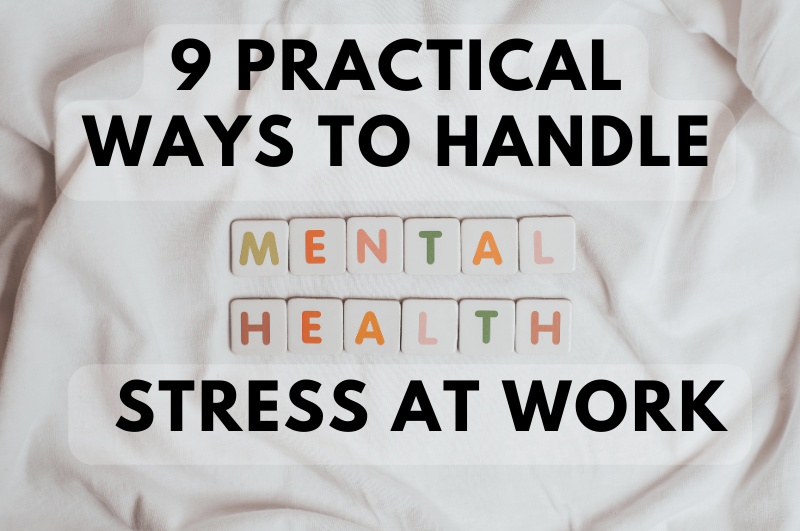In the depths of the mind, a silent battle rages. Mental health at work is often hidden but it impacts every aspect of life. Hiding only makes things worse. It is about time that we take our mental health into our hands and break the stigma around it.
Mental health is the way we think, feel, and cope with life's ups and downs. We all feel down sometimes and that's okay. How we deal with and overcome our issues is what truly matters. When we feel happy and satisfied, we have a sense of purpose and direction, the energy to do the things we want to do, and the ability to deal with the challenges that happen in our lives. More importantly, we feel happy in ourselves, it gives a boost to our self-beliefs and self-confidence.
Our attitude towards our life changes. We are more optimistic about the challenges we face and the opportunities we receive. Moreover, we tend to be really motivated and productive in the healthiest possible way when we are satisfied and at peace.
Most of us take great care of our physical well-being. We go to the gym, visit our doctor when sick and take preventive and precautionary measures. What gets overlooked is our mental health. However, that shouldn’t be the case. Mental health is equally important as physical health.

Signs and symptoms of a mental health issue at work
Everybody has bad work days from time to time when nothing seems to be going right. You might find it hard to concentrate, you might feel unappreciated, overly stressed, or irritable, or you might not have the energy or motivation to finish even the most basic task. However, if you experience this every day, it may indicate that something is wrong.
It is essential to be aware of any changes in how you are thinking, feeling, and acting, even though the symptoms of mental health issues can vary greatly depending on the condition and the person experiencing them.
The following symptoms are given below:
- Low performance at the workplace
- Trouble concentrating and thinking
- Changes in your mood
- Loss of interest in activities
- Fear or nervousness
- Increased sensitivity
- Sensitive to sights and sounds
- Avoid any situations that are over-stimulating.
10 Practical Ways to Deal with Stress at Work: Manage Your Mental Health Like A Pro
1. 5, 4, 3, 2, 1 Countdown
5, 4, 3, 2, 1 Countdown is one of the most common, and effective grounding techniques recommended by mental health professionals. It assists to relax you when you are feeling anxious, depressed, stressed, or even overwhelmed
Here’s how to practise it:
Sit silently. Look around and notice -
5 things you can see: Your hands, laptop, plant, mobile, Bottle
4 things you can physically feel: Your feet on the ground, desk, keyboard, chair.
3 things you can hear: Voice of a fan, horns, birds chirping,
2 things you can smell: Room-freshener, Coffee.
1 thing you can taste: A mint.
2. Practice Self-care
Getting enough quality sleep at night, eating a healthy, nutritious diet, and regularly exercising, deep breathing, or meditation can make a huge difference to your mental health.
It is important to maintain a healthy work-life balance, prioritising time for hobbies, relationships, and self-reflection. Taking care of yourself ultimately leads to an increased satisfaction from life and a happier you!
The more effort you put into self-care, the better you’ll feel.

3. Do something that makes you happy
Not doing things you love will make you feel worse, or even more guilty because you're not doing anything to make your heart feel a little lighter.
Sure, you may feel like you no longer enjoy those activities. But is it truly the case or do you just feel like you’ve lost interest in your favourite activities due to how you’re feeling right now?
In busy work life, making time for activities that bring you joy and happiness is vital for mental health. Whether it's pursuing a hobby, spending time with loved ones, or engaging in creative endeavours, doing something that makes you happy can have a significant positive impact on your overall mental health.
It doesn’t have to be something huge. It might be as little as painting your nails or making an aeroplane out of paper. It can be anything as long as it brings you joy.
It gives you an opportunity to relax, unwind, and recharge. Make time for these in your schedule, even if it’s merely for 10 minutes. How you feel is the only thing that matters at the end of the day. Your well-being should always be your priority, no matter what. Taking the time to do what brings you joy is a powerful way to nurture your mental health. Give yourself the love you deserve.
4. Take Frequent Breaks
Taking frequent breaks throughout your workday is essential for maintaining your mental health and productivity. Breaks provide an opportunity to rest, recharge, and refocus, prevent burnout, and improve your overall health. Step away from your desk, stretch your body, or take a short walk to get some fresh air.
Use your break time to engage in activities that relax and rejuvenate you, like reading, listening to music, or practising mindfulness. By incorporating regular breaks into your routine, you’ll not only feel better but will also be able to perform better. Breaks are not a waste of time but a valuable investment in your mental and emotional health.
5. Engage yourself in fun group activities and events
It's okay to stay alone for a while. However, it is equally crucial to get yourself out there. Engaging in fun group activities and events at work can have a positive impact on your mental health and overall job satisfaction. Participating in team-building exercises, social events, or recreational activities creates a more supportive work environment.
These activities provide an opportunity to bond with colleagues, relieve stress, distract yourself from your issues and focus on a more positive energy. Whether it's a team outing or game night, these shared experiences release happy hormones, enhance teamwork, and communication, and create lasting memories.
6. Introspect
Taking the time to introspect is crucial for maintaining good mental health at work. Set aside moments to reflect on your thoughts, emotions, and overall health. Ask yourself questions and dig into your answers. Learn more about yourself. Because when you’re more aware of yourself, your needs, beliefs, values, and what’s affecting you, you’re more likely to come up with solutions that will help you not only now but also in the long run.
Introspection also helps in identifying stress triggers and finding effective coping mechanisms. By cultivating self-awareness, you can make better decisions, set realistic expectations, and communicate your needs effectively. The only precaution you need to take is not to loathe yourself and ruminate over and over on the same thoughts, situations, or circumstances.
7. Express your feelings
Letting your feelings out might help you improve your mental health and manage difficult moments. Speaking about your feelings isn't a sign of insecurity; it's part of taking control of your health and doing everything you can to be well.
Being vulnerable in front of a closed one is strength and not otherwise. Most people are scared to express their feelings. Don’t be one of them. You can do better.
You can express your feelings to your closest, loved ones or even your colleagues. You’d be surprised to see how many people are willing to help and root for you. This will also give them space to talk about their feelings when they need it.
If you don’t feel comfortable doing that, you may as well reach out to support groups or a mental health professional. Anything that floats your boat is good.
8. Talk to your employer
Initiating an open and honest conversation with your employer about your mental health is vital for creating a supportive work environment. If you're experiencing challenges, stress, or burnout, don't hesitate to schedule a meeting to discuss your concerns. Share your feelings, express your requirements, and ask for possible solutions.
A supportive employer will listen and collaborate with you to find ways to reduce your stress, such as flexible work arrangements or workload adjustments. By speaking up, you not only prioritise your health but also help your employer understand the importance of mental health in the workplace. Together, you can work towards a healthier and more productive work environment.
9. Take Professional Help
If you are struggling with your mental health, seeking professional help is crucial. Consider reaching out to a therapist, counsellor, or a mental health professional who can provide guidance and support.

They can help you develop coping mechanisms, manage stress, learn and explore yourself, and navigate work-related challenges as well as challenges in your personal life.
If you’re in a crisis, please contact these hotline numbers.
Taking proactive steps, however little they might be, goes a long way in helping you restore balance in your life for now and in the future. You might not see the effects immediately but its impact is higher than you can imagine.
How you feel impacts both your personal and professional life. Both personal life and professional life are important for obvious reasons. Navigating through professional life when your personal life is messed up can be challenging, and vice versa.
It is important to take necessary steps for managing your stress and mental health. If you’re having trouble with your mental health issues and they have started to affect your work and life, seek help. Don’t wait for things to get heavier. Get the support you need. You deserve it!
